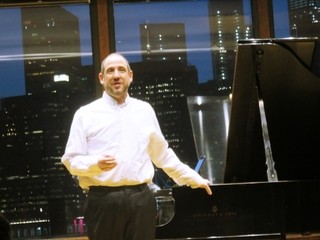|
Back
Concord and Dissonance and Thoreau-ly Modern Donald New York
BargeMusic
05/25/2018 -
Johann Sebastian Bach: Fantasy and Fugue in A Minor, BWV 904
John Aylward: Flux, Ripple, Flutter(New York Premiere)
Elena Ruehr: Summer on the Lakes, in 1843 (World Premiere)
Eric Moe: Where Branched Thoughts Murmur in the Wind – Frozen Rain – Summer Dreams (World Premiere)
Charles Ives: Sonata No. 2 (“Concord, Mass: 1840-60”): “The Alcotts” & “Thoreau” – Varied Air and Variations
Donald Berman (Pianist)

D. Berman at BargeMusic (© Samuel A. Dog)
“If a truth about something is not as I think it ought to be, I'll make it what I think, and it will be the truth — but if you agree with me, then I begin to think it may not be the truth.”
Henry David Thoreau, quoted by Charles Ives in Essays Before a Sonata
It’s too late to hear Chopin play Chopin or Liszt play Liszt. But the chance to hear Donald Berman play Charles Ives is almost as fascinating. Whether Mr. Berman or John Kirkpatrick or lately Jeremy Denk is the “best” Ivesian is a fatuous comparison, though. For Charles Ives would have been thrilled to have anybody of this stature play his gallumphy, mad, mawkish Transcendental (in both senses) and explosive “Concord” Sonata.
Mr. Berman has the advantage of having “discovered” and recorded dozens upon dozens of unknown Ives pieces. They were edited from old manuscripts by Berman or his teacher, John Kirkpatrick. And while this music could have been unplayable, or small in scope, it is never small in meaning. Like the last years of Beethoven’s chamber music, Charles Ives’ piano works are cryptic and philosophical, as immanent as his early Unanswered Question, and as cabbalistic as Grosse Fuge.
(Though far more entertaining than the latter.)
Mr. Berman’s three Ives works were saved for the last in this beautifully melded program at BargeMusic last night. That East River setting always calls for al fresco themes, and we were not disappointed. John Aylward’s Flux, Ripple, Flutter gave voice to mythical birds. Eric Moe’s three short works were obviously those of nature. And Elena Ruehr’s Ivesian titled Summer on the Lakes, in 1843 also referred to that mentor and editor of Concord’s philosophers, Margaret Fuller.
Mr. Berman, however started with the more closeted work, Bach’s A Minor Fantasy and Fugue, a fairly colorless performance of a clavier piece which Ives had studied and could have transposed for his beloved organ. (My feeling is that if you have a piano, give it pianistic color, don’t imitate a pallid clavichord.)
After this, he gave first performances of three excellent American composers. John Aylward’s three-moveent Flux, Ripple, Flutter was based on the avian metamorphoses of Ovid. To be more exact, the changes from human to bird.
I have no idea of he was giving exact sections to exact stories, or he was just Messiaen around. Although Ovid had particular delight in talking about Procne, who broiled her son and served him to the family, later turning into–no pun intended–a swallow.
Perhaps Mr. Aylward was giving vent to the emotions of being transformed. The first movement moved from a rolling bass to the top-notes (it sounded like a Rachmaninoff prelude), then came a movement of pecking and a third movement of flutters on the keys. A difficult work, which, if actual narrative, might have been more cohesive. As it was, the piano pyrotechnics were sufficient.

E. Ruehr/J. Aylward (© Samuel A. Dog)
Elena Ruehr’s Summer on the Lakes, in 1843 was the most Ivesian–or most “Alcottian”–work on the program. Her subject was that most intriguing Transcendental woman, Margaret Fuller, one of Emerson’s editors, an advocate for woman’s rights, prison reform and slavery abolition, amongst other themes, most of which we are still fighting for two centuries later.
Ms. Ruehr’s lovely work was not in fightin’ spirit. There was a contentment, quotes from hymn tunes (perhaps original). Perhaps the lake was Walden, perhaps another Massachusetts waterway upon which Thoreau and his friends rowed and talked. Musically it was somewhat retro: Ives would have exploded at some point, but Ms. Ruehr retained the tranquility.
The three works by Eric Moe (one based on a line from Keats) each had nature subjects, the difficult works were played with elegance by Mr. Berman, but I couldn’t get my teeth into them, rarely found interesting measures.
Or perhaps I was waiting for Mr. Berman’s three Ives works, including the final movements from “Concord”. “Alcotts” is always wonderful. An Ovidian metamorphosis from uncomplicated Victorian sentiment to Beethoven’s Fifth, which was Ives’s way of taking the home-life of father and daughter seething with the flames of Abolition.
“Thoreau” was far far more complicated. Ives’ original had a flute solo (Thoreau played the instrument), omitted here. It isn’t necessary, but it does give some landmarks to follow the sporadic emotional breadth. Donald Berman played it with all the technical purpose it demands. Yet–and this was most important–that old-fashioned musical feeling, that Alcott-style sentiment always present. Never finished, never a thing in itself, but a vital part of Thoreau’s own contradictions.
(When visiting the Alcott home in Concord, I found that Louisa May had had a “crush” on Thoreau, and his musical note to her was written on a manuscript. The tune was not very good.)
In between was an Ives work new to me, and a total delight. Mr. Berman was the first to record Varied Air and Variations, yet I would love to hear it again and again. The “air” was a march-tune (his father was a bandmaster) in unison played with both hands. After that...well, that was Charley Ives having rip-roaring fun. Not that I could figger out where original air was located. The “variations” were part marching songs, part digital impossibility (not to Donald Berman) and part sentiment, actually quite beautiful.
While the other composers were hardly Lilliputian, Charles Ives was a giant in every sense of the word. And if we had our druthers, it would be wonderful to have Donald Berman play a whole evening from this towering, transcendental mind.
Harry Rolnick
|